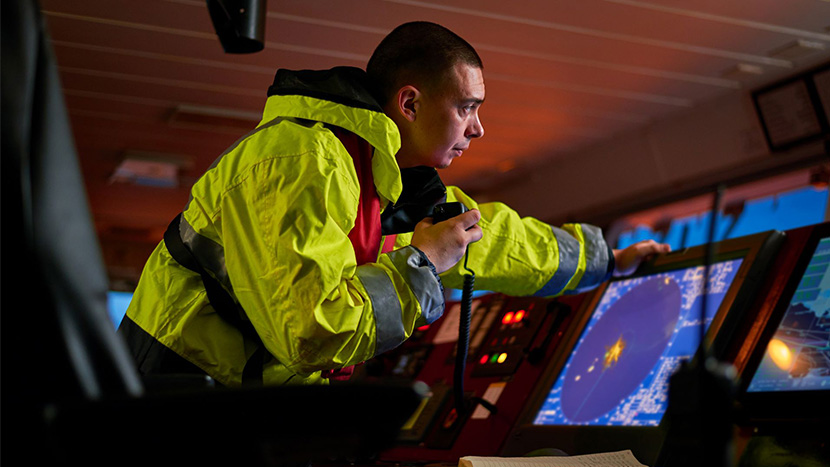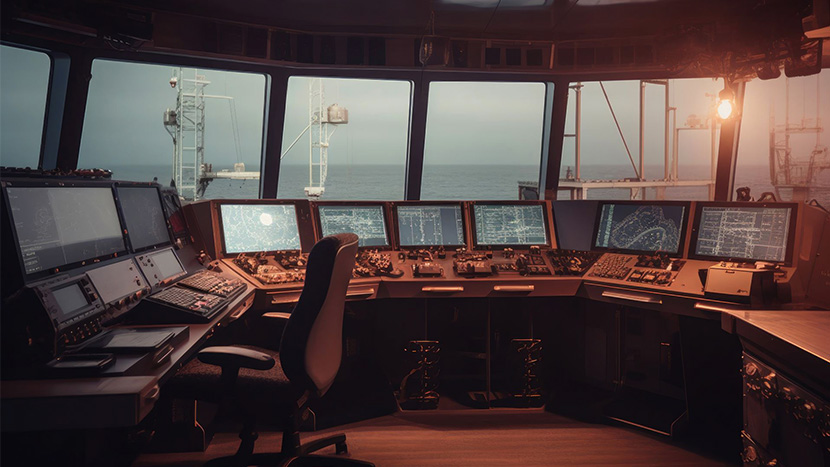Navigating The Future: The Revolutionary Role Of AI In Maritime Operations
In maritime industry operations, the incorporation of artificial intelligence (AI) has emerged as a transformative force. Integrating AI technologies, ranging from predictive analytics to autonomous vessels, reshapes how ships navigate, communicate, and optimize operations. This revolutionary role of AI in the maritime industry enhances efficiency and safety and addresses critical challenges like environmental sustainability and the need for cost-effective operations.
The Maritime Industry: A Brief Overview
The maritime industry is a cornerstone of the global economy, operating as the circulatory system of international trade and commerce. Its extensive scope encompasses various sectors such as container shipping, bulk carriers, oil tankers, and cruise liners, all of which contribute to the seamless flow of goods, energy resources, and even people across the world’s oceans. Considering that over 80% of global trade relies on seaborne routes, the maritime industry’s impact on the global economy cannot be overstated. It serves as a crucial conduit for the movement of goods and commodities, fostering international trade and economic growth.
In an era where supply chains span continents and consumer demands are met with a click of a button, the maritime industry’s efficiency and sustainability have become paramount in maintaining the world’s interconnected economies. Consequently, integrating artificial intelligence into maritime operations promises to stream these operations and address the industry’s evolving challenges in an era of globalization and environmental consciousness.
The Rise Of Artificial Intelligence In The Maritime Industry
Over the past decade, the maritime industry has witnessed a gradual but profound shift towards integrating AI. This transformation is driven by various factors, including advancements in sensor technologies, increased computational power, and the industry’s recognition of the potential benefits of AI.
Artificial intelligence in maritime industry encompasses various applications designed to address specific challenges and optimize multiple aspects of maritime operations. Let’s explore some of the key areas where AI is making waves:
Navigational Enhancements
Safety at sea is a top priority for the maritime industry, and AI has significantly contributed to improving navigation systems. AI-powered navigation systems leverage data from sensors, satellites, and historical ship routes to provide real-time information on weather conditions, potential hazards, and the most efficient routes. These systems can make split-second decisions to avoid collisions, reduce fuel consumption, and enhance overall voyage safety.
One notable example of AI-enhanced navigation is the use of autonomous ships. These vessels rely on AI algorithms to navigate and operate without direct human intervention. While fully autonomous ships are still in development and face regulatory hurdles, they promise to reduce the risk of human error, enhance safety, and optimize fuel consumption.
Predictive Maintenance
Maintenance of maritime vessels is a costly and complex undertaking. AI-driven predictive maintenance solutions analyze vast amounts of data from onboard sensors to predict when components or systems are likely to fail. By identifying potential issues before they become critical, ship operators can schedule maintenance proactively, reducing downtime and minimizing repair costs.
Predictive maintenance also contributes to vessels’ longevity, making them more environmentally sustainable. By preventing unexpected breakdowns, ships can operate more efficiently, consume less fuel, and emit fewer pollutants, aligning with global efforts to reduce carbon emissions from the maritime sector.
Cargo Management And Optimization
Efficient cargo handling and management are crucial for the profitability of shipping companies. AI systems can analyze historical data, current market conditions, and real-time information to optimize cargo loading, storage, and unloading processes. This ensures that vessels carry the right cargo in the most space-efficient manner, leading to cost savings and reduced environmental impact.
Furthermore, AI algorithms can predict changes in cargo demand and market trends, enabling shipping companies to adapt their operations in real time to capitalize on opportunities and mitigate risks.
Environmental Sustainability
The maritime industry faces increasing pressure to reduce its environmental footprint. AI is pivotal in achieving this goal by optimizing vessel operations to minimize fuel consumption and emissions. AI-driven solutions can analyze data from various sources, including weather patterns, sea conditions, and engine performance, to recommend the most fuel-efficient routes and speeds.
Moreover, AI is instrumental in developing alternative propulsion systems, such as electric and hydrogen-based technologies. These environmentally friendly solutions could revolutionize the maritime industry by reducing its reliance on fossil fuels and mitigating its impact on the planet’s ecosystems.
Security And Risk Management
The maritime industry is not immune to security threats, including piracy, cyberattacks, and smuggling. AI-powered security systems use advanced algorithms to monitor vessels and detect anomalous behavior, potential threats, and cybersecurity breaches. This proactive approach enhances security at sea and protects valuable cargo and personnel.
Additionally, AI-driven risk assessment models can evaluate the safety of shipping routes and port facilities, helping shipping companies and insurance providers make informed decisions to mitigate potential risks and reduce insurance costs.
Data-Driven Decision Making
Over the past decade, the maritime industry has witnessed a profound shift toward the integration of artificial intelligence (AI). This transformation is driven by advancements in sensor technologies, increased computational power, and the industry’s recognition of the potential benefits of AI.
AI in the maritime sector encompasses various critical areas, including navigation enhancements, predictive maintenance, cargo management, environmental sustainability, security, and data-driven decision-making. AI is essential in assisting maritime professionals in making data-driven decisions by analyzing vast datasets to improve efficiency and cost savings.
For example, AI can identify weather patterns for optimized route planning, analyze historical market data for strategic decision-making, and enhance operational efficiency.
AI’s increasing role in the maritime industry spans numerous aspects, promising a safer, more efficient, and environmentally responsible future while bolstering data-driven decision-making at sea.
Challenges and Future Prospects
While the integration of AI in maritime operations holds immense promise, it also presents several challenges. Regulatory frameworks, ethical considerations, and cybersecurity concerns are among the issues that must be addressed to ensure the responsible and safe adoption of AI in the maritime industry.
Furthermore, the industry must invest in workforce development to equip maritime professionals with the skills to operate and maintain AI-enhanced systems. Collaborations between academia, industry stakeholders, and governments are essential to navigate these challenges successfully.
Conclusion
The maritime industry’s adoption of artificial intelligence is not a passing trend but a vital necessity for its continued growth and sustainability. By addressing the challenges and seizing the opportunities presented by AI, the maritime sector can chart a course toward a brighter, more efficient, and environmentally responsible future on the high seas. As AI continues to evolve, its transformative impact on maritime operations will undoubtedly reshape the industry, creating a safer, smarter, and more adaptable maritime landscape to meet the world’s changing needs.


































































































